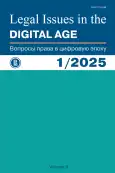Digital Technologies and Forensic Examination of Copyright Works
- Authors: Buzova N.1
-
Affiliations:
- Russian State University of Justice
- Issue: Vol 6, No 1 (2025)
- Pages: 105-123
- Section: Copyright Law in the digital age
- URL: https://bakhtiniada.ru/2713-2749/article/view/293444
- DOI: https://doi.org/10.17323/2713-2749.2025.1.105.123
- ID: 293444
Cite item
Full Text
Abstract
With the ability to enable remote trial sessions and promptly find and forward documents, digital technologies are increasingly used in judicial proceedings worldwide including Russia. However, in view of possible risks artificial intelligence is used at court only in the test mode, including for forensic examination of copyright works as a likely option. The article contains a discussion of the benefits and risks of AI when used for forensic examination. It is argued that AI can only serve as a tool for forensic examination, with shared approaches applicable to all copyright works to be developed and made available to judges, as well as expert opinion templates.
About the authors
N. Buzova
Russian State University of Justice
Author for correspondence.
Email: nbuzova@yandex.ru
ORCID iD: 0000-0003-2268-0345
References
- Anokhin K.V., Novoselov K.S., Smirnov S.K. et al. (2022) Scientific uses of artificial intelligence and a science of Artificial Intelligence. Voprosy filosofii=Issues of Philosophy, no. 3, pp. 93–105 (in Russ.)
- Antimonov B.S., Fleishits E.A. (1957) Copyright Law. Moscow: Gosyurizdat, 278 p. (n Russ.)
- Averianova T.V. (2009) Forensic Examination. A Course of General Theory. Moscow: Norma Publishers, 479 p. (in Russ.)
- Belenkaya O.S., Strelkova I.B., Filippova O.A. et al. (2021) Methodological Guidelines for Forensic Examination of Dissertations for Original Content in the Antiplagiat System. Saint Petersburg: Lan Publishers, 92 p. (in Russ.)
- Belkin R.S. (1987) Forensic Science: Challenges, Trends, Prospects. General and Special Theory. Moscow: Yuridicheskaya literatura, 270 p. (in Russ.)
- Drobysheva A.V. (2022) Prospects of Using AI in the Peace Justice Court System. Mirovoy sudiya=Peace Judge, no. 11, pp. 17–20 (in Russ.)
- Galiashina E.I. (2006) Potential of Forensic Examination of Speech for IP Protection. Yurislingvistika=Legal Linguistics, no. 7, pp. 176–191 (in Russ.)
- Galiashina E.I. (2020) Towards Higher Quality of Forensic Examination of Recordings through Standardization. Vestnik ekonomicheskoy bezopasnosti=Bulletin of Economic Security, no. 4, pp. 144–148 (in Russ.)
- Galiashina E.I., Privodnova E.V. (2006) Authorship Examination in the Legal Proceedings in Russia. Russkiy zakon=Lex Russica, no. 4, pp. 755–761 (in Russ.)
- Gavrilov E.P. (1984) Soviet Copyright Law. Basic Concepts. Development Trends. Moscow: Nauka, 222 p. (in Russ.)
- Gavrilov E.P. (2020) Intellectual Property Law. General Provisions. XXI Century. Moscow: Yurservitum, 492 p. (in Russ.)
- Ionas V.Ya. (1963) The Creative Work Criteria Work in Copyright Law and Case History. Moscow: Yuridicheskaya literatura, 138 p. (in Russ.)
- Kabatskaya E.A. (2023) Harnessing Artificial Intelligence to expedite legal proceedings. Rossiyskiy sudiya=Russian Judge, no. 10, pp. 51–55 (in Russ.)
- Maylis N.P., Moiseeva T.F. (2018) Standardization of forensic examination as a prerequisite of its progress. Vestnik Nizhegorodskoy Akademii MVD Rossii= Bulletin of Nizhniy Novgorod Academy of Internal Ministry, no. 2, pp. 219–224 (in Russ.)
- Marakhovskaya M.V., Penkevich L.L., Tushkanova O.V. (2015) Public Law Copyright Protection Methods for Computer Software. Manual. Moscow: RGUP Press, 276 p. (in Russ.)
- Medvedev Y. Academician Anokhin: AI today is a black box. Rossiyskaya Gazeta=Gazette of Russia, 20.10. (in Russ.)
- Moiseeva T.F. (2024) Commissioning Forensic Examination: Methodological Guidelines. Moscow: RGUP Press, 40 p. (in Russ.)
- Moiseeva T.F., Maylis N.P. (2017) Forensic Examination. Introductory Course. Manual. Moscow: RGUP Press, 224 p. (in Russ.)
- Momotov V.V. (2022) Justice of the Peace: State, Challenges, Prospects. Mirovoy sudiya=Justice of the Peace, no. 3, pp. 2–9 (in Russ.)
- Piskunova E.V. (2016) Computer Technologies and Forensic Work: Lectures. Moscow: RGUP Press, 152 p. (in Russ.)
- Polevoy N.S. (1982) Forensic Cybernetics. Moscow: MGU University Press, 208 p. (in Russ.)
- Polevoy N.S., Vitruk N.V. et al. (1977) The Principles of Applying Cybernetics to Legal Studies. Moscow: Yuridicheskaya literatura, 272 p. (in Russ.)
- Serebrovsky V.I. (1956) Copyright Law Issues in the Soviet Union. Moscow: USSR Academy of Sciences, 283 p. (in Russ.)
- Sergeev A.P. (2001) Intellectual Property Law in Russia. Textbook. Moscow: Prospekt, 752 p. (in Russ.)
- Sergo A.G. (2023) Antiplagiat and other Ways and Means to Undermine the Quality of Research Texts. Zhurnal po intellektualnym pravam=Journal of Intellectual Rights, no. 4, pp. 40–45 (in Russ.)
- Tahura S.U., Selvadurai N. (2022) The Use of Artificial Intelligence in Judicial Decision-making: the Example of China. International Journal of Law, Ethics and Technology, no. 3, pp. 1–20.
- Tolstukhina T.V. (1998) Automation for Forensic Examination of Road Vehicles. Manual. Tula: University Press, 137 p. (in Russ.)
- Tolstukhina T.V. (1997) Mathematic Methods in Forensic Science. Manual. Tula: University Press, 215 p. (in Russ.)
- Tolstukhina T.V. (1999) The Current Trends of IT-Enabled Forensic Examination. Doctor of Juridical Sciences Thesis. Moscow, 320 p. (in Russ.)
- Valle V.C., Fuentes-i-Gasó J.R., Ajus A.M. (2023) Decisão judicial assist i daporin teligência artificial e o Sistema Victor do Supremo Tribunal Federal. Revista de Investigações Constitucionais, vol. 10, no. 2, pp. 1–38.
- Zamaraeva N.A. (2001) The Legal, Organizational and Methodological Issues of Forensic Use of Computer Technologies. Candidate of Juridical Sciences Thesis. Moscow, 202 p. (in Russ.)
Supplementary files










